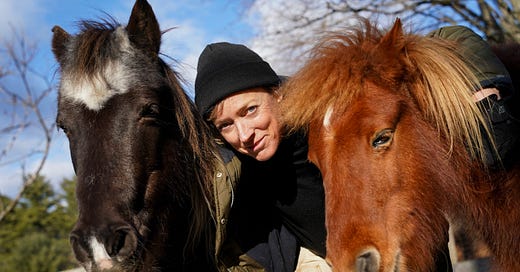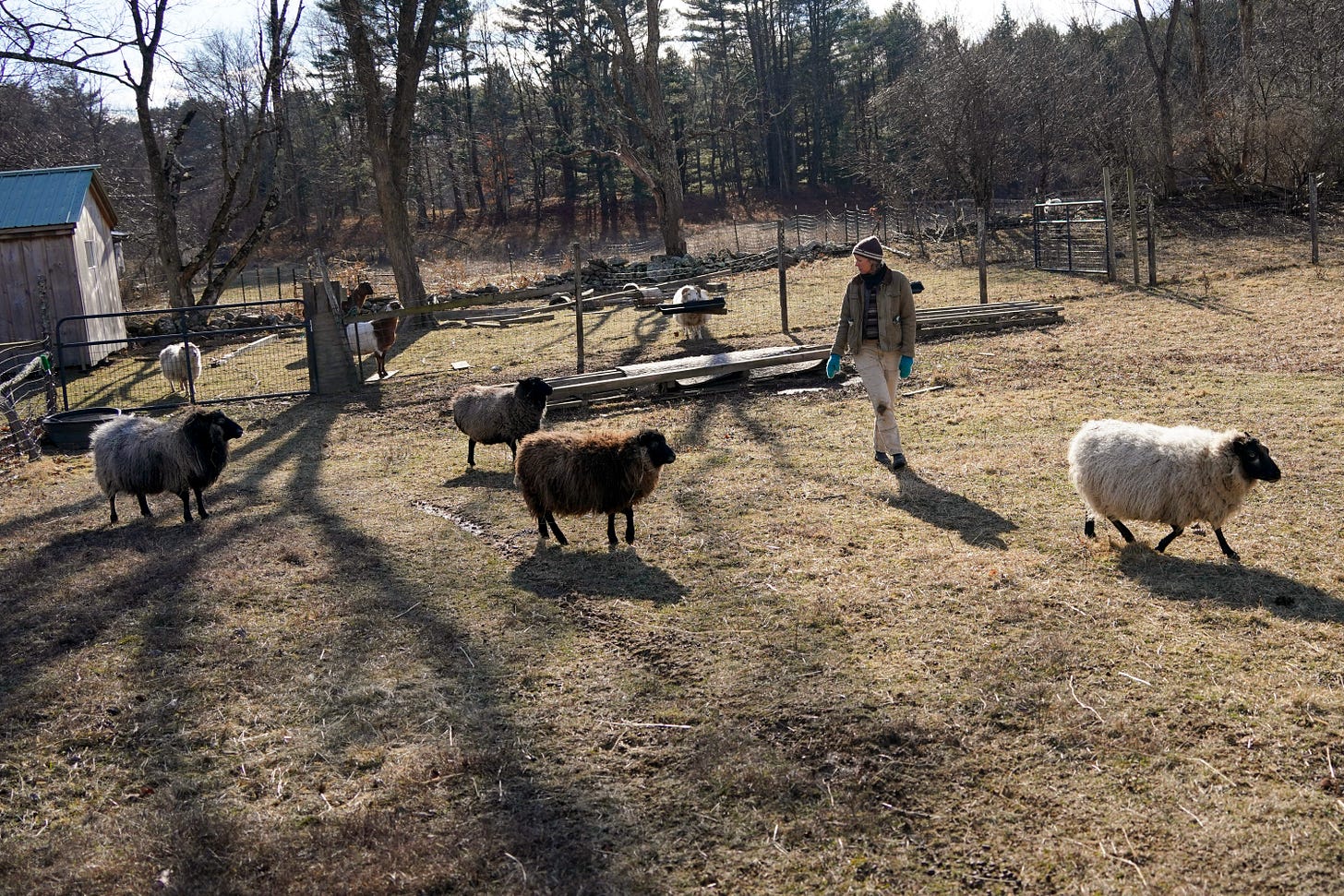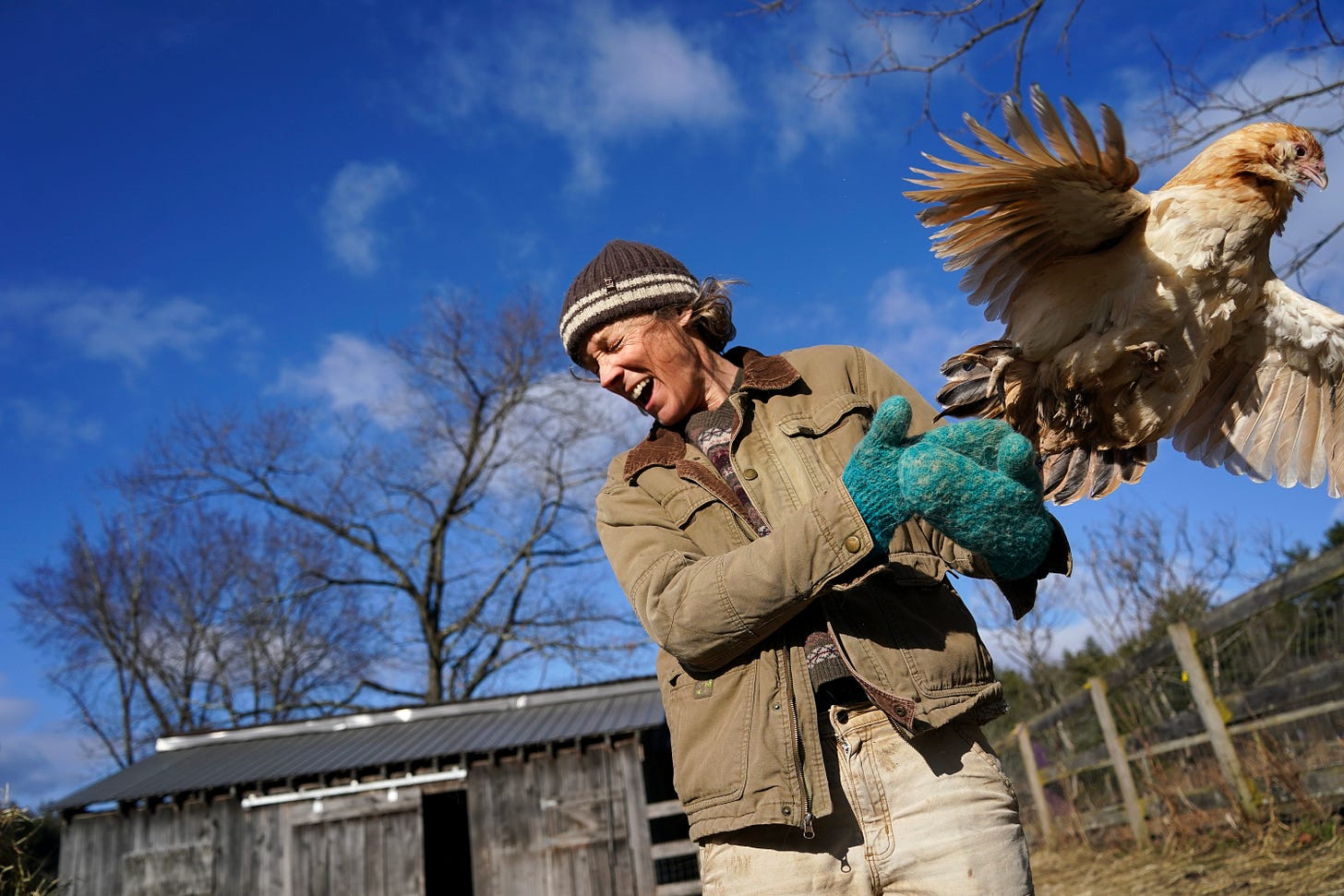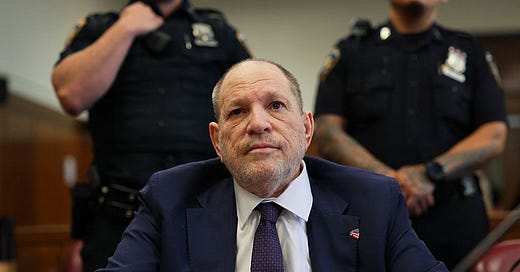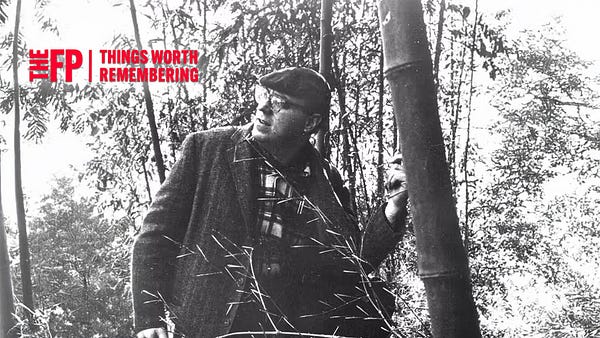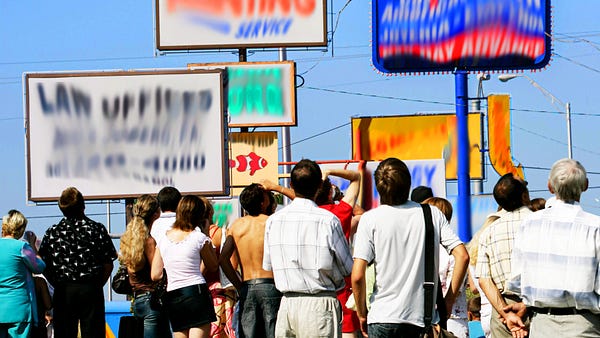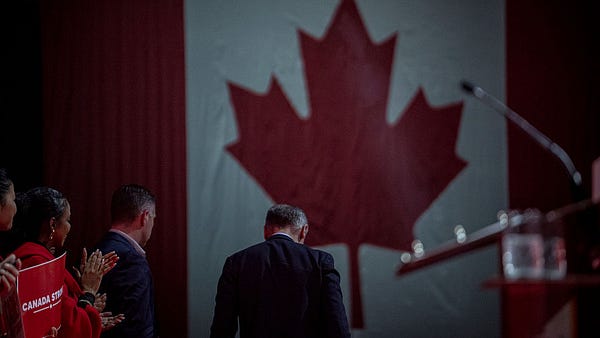
The Free Press

When I first joined The Free Press last spring, Bari told me about a writer who lived on a farm in upstate New York and wrote the most beautiful sentences. Her name was Larissa Phillips, and she’d sent us an essay about an education program she runs—for urbanites who want to go back to the land. We titled it “What City Kids Learn on My Farm,” and its fundamental lesson was this: When you pay attention to nature, you have to accept that humans can’t control everything. “It doesn’t matter how desperately you want to find more eggs, the hens don’t lay on demand.”
Larissa’s message struck a chord with readers, even though—or maybe because—this is a digital age. Dozens of you wrote in to share your own childhood skirmishes with nature. (We published two of the most delightful letters here.) Since then, we’ve published several gorgeous pieces by Larissa, about everything from riding horses to killing turkeys. And the weekend before the election, her deeply personal piece about setting aside political differences went viral—and was featured on Bill Maher’s show. It was called “Whatever Happens, Love Thy Neighbor.”
I could not be happier to tell you that, as of today, Larissa is officially a Free Press columnist. Her essays will be appearing in your inbox more frequently—about once a month—and I guarantee they’ll make you want to turn off your notifications, close all your tabs, and think about what really matters. Larissa’s first official column is about sex, death, and the miracle of life. You know, nothing major. Scroll down to read it now. I hope you love it as much as I do. —Freya Sanders, associate editor
In April, my husband and I walked out to the sheep pasture with a .22 rifle.
We found the lamb in the three-sided sheep shed, alone. Its mother had moved on by then with her healthy offspring, leaving behind this one, born two days earlier with a rigidly bent leg that we had been unable to massage into any kind of movement.
The other ewes, milling around the shed, yelled at us as we carried the lamb away. They followed us to the gate, continuing to bellow as we walked along the fence line into the woods. When we were fully out of their sight, I laid the lamb on the ground, and my husband pointed the rifle toward the back of her head. Then he shot her.
We didn’t want to do this. But we’d determined, through talking to farmer friends, that a quick end to this lamb’s life was the most humane outcome.
This was not what I imagined, 20 years ago, sitting at our kitchen table in Brooklyn, when I said to my husband and our then-young children, “What if we left the city? What if we had a farm?”
Since cities existed, humans have been moving inexorably toward them, a process that has only sped up as time has gone by. In 1900, a tenth of the human population lived in urban areas; today, 50 percent of us do. By 2050, that number will be up to 75 percent. But there have always been idealists and malcontents who have rejected the convenience and excitement and sophistication—not to mention the jobs—of the city, and headed in the opposite direction, back to the land, or the farm, or the woods.
Perhaps their reasons were similar to mine.
I was sick of the grit and the noise and the pace of urban life. After 15 years in an ever more crowded Brooklyn apartment, I wanted a dining room and closets and a driveway. I’d spent a decade coaxing sickly tomatoes and anemic salad greens from containers on fire escapes, and dreamed of a garden where we could produce our own food. It would be healthier and tastier, but also, I’ve always felt a persistent need to grow and build things with my own hands. Maybe in the country I’d learn how to can vegetables and fix a roof, and we might even get horses. I could homeschool my quirky, creative son, instead of leaving him to the mercy of the city’s public school system.
Politics weren’t a factor in my decision to move. Sure, I was sometimes fatigued by the antics of particularly leftist friends. The language policing bothered me, and so did their immunity to common sense in conversations about crime or education. But when we left the city in 2010, no one was really questioning biology, or the concept of truth.
But changes were afoot. After our move, I would watch from afar as progressive, urban America became increasingly governed by ideology, drifting ever further from basic reality. My family, meanwhile, had barely settled into our 15-acre farm in Greene County, New York, when we were confronted with facts of life that we had—like most modern Americans—been able to avoid for years.
The most shocking fact, of course, was death. In the modern urban world, it is mostly encountered in hospitals. But farm life gave us no protection from the fact that death is commonplace, often unexpected—and sometimes brutal. We lost so many animals in such short order that we started keeping a tally, wryly imagining a dark alphabet primer that we would write some day. A is for Al, the big rooster who turned mean and got made into soup. J is for Jeannie, a pretty goat who died giving birth. S is for sheep, who are always dying.
There was no way to protect my kids from this fact of life. An entire brood of chicks or turkey poults could take sick and die in a matter of days, struck by a parasitic infection. There was the summer of the fisher cat, when we were greeted every morning with bloody remains or telltale piles of feathers. Or, a few years later, the summer of the foxes, which would attack the henhouse two or three times a day.
We acquired some fluency in the matter, a sense of discernment. A good death came to seem like a blessing. A bad death could keep you up at night, especially if you’d had a hand in it. My culpability was often tied to my clumsy efforts at empathy—like when, in our second year of farming, I tried to save a goat from a blocked urethra. Both the goat breeder and the farm vet said it was hopeless; the latter offered to slaughter him for me. I was horrified. In the city I had never learned this basic truth: that the greatest kindness sometimes comes from a swift blow.
Not realizing this, I took the goat to a pet vet, who offered to perform a risky, somewhat experimental surgery to get around the blocked urethra. The goat died, agonizingly, of a burst bladder a few days after the operation. I’ve often thought of it in the years since, when faced with an injured chicken or that newborn lamb with its bent leg.
Even now, I hate witnessing death. But at the same time, I can’t help but appreciate the experience. Parents are often told that children should grow up with pets in order to learn what it’s like to lose a beloved, living thing—and I agree with that. If the only deaths we experience are the huge, utterly devastating ones, we never have a chance to practice grieving on a smaller scale, or to become more familiar with the concept of death. There’s a reason all cultures, around the world and throughout history, have rituals and practices for dealing with it: because it’s unavoidable.
And then there’s sex. In a standard American city, it’s rare now to see a dog or cat that isn’t neutered, and therefore devoid of sexual expression. But here on the farm, the act resounds in all its glory. The roosters are constantly mating with the hens. When the ground thaws, there’s a nearly deafening chorus of tiny frogs screaming for sex.
As part of a homeschooling project, my son kept a herd of goats. Around November, he would watch for signs of the heat cycles of his does, which include tail wagging, vocalizing, and lots of frisky jumping on top of each other.
“Mom,” he’d yell, running into the house from the barn. “Ruby’s in heat. We gotta go.”
Female goats only feel like having sex for 12 to 24 hours every three weeks or so, for just a few months of the year, so we’d rush to load her up in the back of our mini SUV and head 90 minutes south to the breeder. Here, my son would loosely hold the doe’s lead rope while one of the breeder’s interns brought out the buck.
Goat bucks are foul, lascivious creatures, and yet somehow extremely attractive to a doe in heat. On one occasion, we all—my 13-year-old son, 9-year-old daughter, the breeder, her interns, and I—stood in a circle to watch as the two goats engaged in graphic foreplay, which ended with what looked like a successful union. A goat penis is almost 12 inches long and not much thicker than the width of a pencil. Both skill and luck are required to make the target.
“Did he get her?” the breeder asked.
One of the interns, hands on his knees and head tilted sideways to see better, cheerfully confirmed that the buck had.
Living on a farm demystifies the act of sex, bringing it back from a filtered, scripted, and commercialized display to a common earthly fact that is one part of a larger cycle. It also demystifies, well, sex—as in, the distinction between what’s male and what’s female.
As we were settling into rural life, the existence of this binary was becoming a topic of public debate, with actual scientists arguing against it. I was starting to wonder whether the fact that Americans are increasingly cut off from nature had something to do with this shift. Of course, gender ideology has reached rural areas, including ours, but it’s hard for anyone who’s grown up around unneutered animals to make the argument that binary sex doesn’t exist, as Scientific American did last year. Male animals fight constantly over territory and women. Testosterone is a mighty force. Female animals are less aggressive and less territorial—except when their young are threatened. In 2022, when The New York Times published an essay titled “Maternal Instinct is a Myth That Men Created,” I was busy marveling over the animal mothers on my farm, who exhibit the most astonishing commitment to their offspring.
I’ve seen mother hens keep track of more than a dozen chicks—and wait for number 14, who was struggling to catch up, unseen and unheard. (Can chickens count? How did she know she was missing one?) I’ve seen mother goats sniffing the kids that wander up to them, and irritably butting away the ones that aren’t theirs.
“It’s the same with humans,” I told my own children. “Your own baby smells so delicious, it’s intoxicating. Other people’s babies smell like baby powder and apple juice.”
The more time I have spent with animals, the more they remind me of humans. It’s humbling to recognize that we share deep and powerful instincts with other creatures. But it’s awe-inspiring too. Seeing how sex shapes life, just as death does, makes me feel connected to something bigger than myself.
If confronting death is scary, and watching sex is weird, witnessing a birth is both these things. But it is also marvelous. I will never get over the stunning sight of a chick emerging from an egg. How does that happen?
In New Rochelle, the working-class neighborhood just past the Bronx where I lived as a child in the ’70s, you’d be invited to tiptoe into a neighbor’s kitchen to witness a mother cat grooming the strange appendages attached to her belly like fat sleepy ticks. Once, I even saw the kittens being born—tiny dark wet things emerging unfathomably from the cat’s rear end, a mundane event containing all the mysteries of the world.
I saw all these things before I turned 7. They were remarkable but also normal.
And I’m glad my kids have seen them too. In modern, urban America, the opportunity to witness such things rarely presents itself. In our rural life, it happens organically and often.
When my daughter was in fifth grade in 2013, she slept at a friend’s house one school night. The next morning, her friend’s mom texted me to say that their pig was giving birth and she wanted to keep the girls home from school so they could help out. “I think that’s worth missing school for,” she said to me after I drove over to pick up my daughter. As the girls excitedly showed me the litter of tiny pink piglets, I agreed.
By then, we’d been living on the farm for a few years, and my daughter had seen several goats give birth. She’d also seen animals mating—and others being slaughtered. My son had helped butcher chickens. I hadn’t imagined these gory details back at our Brooklyn kitchen table when I first suggested moving to a farm. But as American society has become ever less comfortable with death and sex and birth, I’m grateful my kids have had some experience with these wondrous realities, as tough and strange as they sometimes are.
This year, our farm turns 15. We are not even halfway through the hardest winter we’ve had in a few years, but every evening we now have a few more minutes of light by which to do the chores. I've been sketching out my 2025 garden, which will include a new bed of blueberry bushes and more root vegetables. I'm wondering whether, if we rehomed some of our elderly sheep, we'd have room for another horse. But that's probably just a pipe dream, exactly what this frozen resting season is for.
I’m not about to issue a call to the masses to return to the land. As we barrel toward an increasingly urban existence, my intention is simply to plant a flag in the age-old place where death and sex and birth are potent forces that don’t go away just because we believe we’re too modern for those things now. You can plant a flag too, wherever you are. Use your hands. Plant seeds on your windowsill. Guard your thoughts like a cranky homesteader who’s seen a thing or two and can’t be bought. Let’s resist! You don’t have to go back to the land to grasp hold of reality.

